Leadership for Urban Sustainable Development
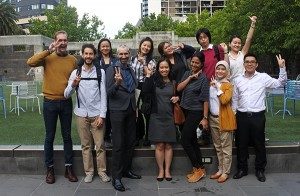 The 2018 ProSPER.Net Leadership Programme was held from 12th – 16th November in Melbourne, Australia, hosted by RMIT University, under the theme ‘Leadership for Urban Sustainable Development’.
The 2018 ProSPER.Net Leadership Programme was held from 12th – 16th November in Melbourne, Australia, hosted by RMIT University, under the theme ‘Leadership for Urban Sustainable Development’.
At this point in history, over one-half of humanity is living in urban spaces – by 2050, over two-thirds of the global population is projected to live in cities. Developing the skills to lead on sustainable urban development whether it’s within city government, finance, education, or the non-profit sector is crucial.
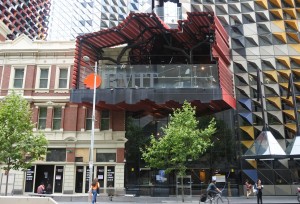 Ten participants from across the Asia-Pacific region took part in the week-long programme, learning about the challenges and opportunities in urban sustainable development within the context of the United Nations’ New Urban Agenda, as well as the Sustainable Development Goals (SDGs), drawing from examples of local leadership in Melbourne.
Ten participants from across the Asia-Pacific region took part in the week-long programme, learning about the challenges and opportunities in urban sustainable development within the context of the United Nations’ New Urban Agenda, as well as the Sustainable Development Goals (SDGs), drawing from examples of local leadership in Melbourne.
The ProSPER.Net Leadership Programme is an opportunity to bring academia, the public sector, the business community, and civil society together to explore how education and training can be used across sectors to foster more sustainable societies in the Asia-Pacific region. By bringing together a group of individuals from a diverse range of sectors and backgrounds, the programme forges a growing network of sustainability researchers and professionals within the region, whilst also developing leaders to tackle the world’s growing sustainability challenges.
Read a summary of the programme here.
——————————————
Programme
Monday 12 November, 2018
| Time | Presentation | Presenter/s | Outcome/s |
| 9:00-10:00 | Opening Session / Welcome Remarks | Dr Usha Iyer-Raniga (RMIT University), Dr Philip Vaughter (UNU-IAS) | |
| 10:00-11:00 | RMIT Welcome Innovation Sprint | Uncle Ian (Aboriginal Elder), Prof Calum Drummond (RMIT University) Michael Nolan (UN Global Compact – Cities Programme) | Presentation slides |
| 11:30-12:30 | World Café | Bayswater Business Precinct brief Stories of Country: Tourism Incubator brief Inner Metro Sustainability Hub (IMSH) brief | |
| 13:30-16:30 | Innovation Process |
Tuesday 13 November, 2018
| Time | Presentation | Presenter/s | Outcome/s |
| 10:00-11:00 | UN SDGs, NUA, Current Challenges | Dr Usha Iyer-Raniga (RMIT University) | Presentation slides |
| 11:30-12:30 | Sustainability Leadership 1 | Dr Philip Vaughter (UNU-IAS) | Presentation slides |
| 13:30-15:00 | Sustainability Leadership 2 | Dr Philip Vaughter (UNU-IAS) | Presentation slides |
| 15:30-17:00 | RMIT and SDGs | Renzo Mori Junior (RMIT Property Services) | Presentation slides |
Wednesday 14 November, 2018
| Time | Presentation | Presenter/s | Outcome/s |
| 09:00-10:00 | Aboriginal Engagement at RMIT Ngarara Willim | Kevin Moore (RMIT University) | Presentation slides |
| 10:00-11:00 | Can Melbourne Remain the (Second!) Most Liveable City? | Dr Susie Maloney (RMIT University) | Presentation slides |
| 11:30-12:30 | City of Melbourne Strategy on Sustainability | Steven McKellar (City of Melbourne) | Presentation slides |
| 13:30-15:00 | Housing Challenges in Australia | Prof Tony Dalton (RMIT University) | Presentation slides |
| 15:30-16:30 | Future of Cities | Tony Crabb (Cushman and Wakefield) |
Thursday 15 November, 2018
| Time | Presentation | Presenter/s | Outcome/s |
| 11:30-12:30 | Discussions on Nightingale Model | Jeremy McLeod (Breathe Architecture) |
——————————————
Case Study Analysis
Relevant Contributions to Target 11.2 by the Shenzhen Municipal Government and Transportation Bureau – Mr. Joseph Strzempka
Case study: Beijing Mobike Technology Co. Ltd. – Mr. Esteban Vélez Vega
Phasing Towards Sustainable Mobility in Penang – Ms. Vishanthini Kanasan
Case Study: Ayala Land, Inc. – Ms. Pamela Gloria Cajilig
Raising Public Awareness on Green and Public Spaces: Upping the Game for Inclusivity and Engagement – Ms. Zahra Zafira Mutiara
Case study: Krabi Town, Thailand – Ms. Thitichaya Boonsom
Case study: Mongolia – Ms. Zoljragal Mendbayar
Case study: Ministry of Energy, Thailand – Ms. Ranaporn Tantiwechwuttikul
Sustainable Transport Systems in China – Ms. Hao Yin
Recommendations for Sustainable Development of Cities in Coastal Areas in Vietnam – Mr. Tran Anh Tuan
——————————————
Sustainable Urban Development Recommendations for the City of Melbourne
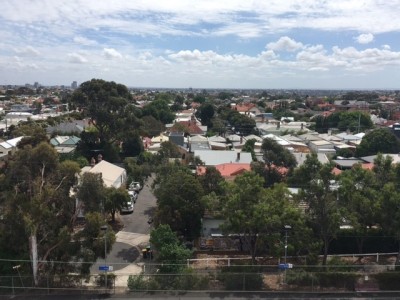 Group 1: SDG Target 11.1
Group 1: SDG Target 11.1
Sustainable Urban Development Recommendations for the City of Melbourne: SDG Goal 11, Target 11.1
Ms. Ranaporn Tantiwechwuttikul – Office of Energy Regulatory Commission of Thailand
Ms. Zoljragal Mendbayar – Advocacy Officer at UNDP Mongolia
Group 2: SDG Target 11.2
Sustainable Transportation in Melbourne
Mr. Joseph Strzempka – Shenzhen City – Nanshan District Education Bureau
Mr. Esteban Vélez Vega – Latin America BiciCo
Ms. Hao Yin – Tsinghua University
Group 3: SDG Target 11.6
Municipal Solid Waste: Is it Garbage or Gold?
Ms. Vishanthini Kanasan – Diplomatic and Administrative Officer, Government of Penang
Ms. Thitichaya Boonsom – Unity Radio Krabi
Group 4: SDG Target 11.7
Assessing the Green and Open Spaces of the City of Melbourne
Mr. Tran Anh Tuan – Vietnam Institute for Development Strategy
Ms. Pamela Gloria Cajilig – Curiosity Design Research
Ms. Zahra Zafira Mutiara – Policy and Institutional Building Officer at WWF Indonesia
——————————————
Reflections on Urban Sustainable Development in Your City
Quezon City, Philippines – Ms. Pamela Gloria Cajilig
Shenzhen, China – Mr. Joseph Strzempka
Tokyo, Japan – Mr. Esteban Vélez Vega
Bangkok, Thailand – Ms. Ranaporn Tantiwechwuttikul
Hanoi, Vietnam – Mr. Tran Anh Tuan
Krabi, Thailand – Ms. Thitichaya Boonsom
Beijing, China – Ms. Hao Yin
——————————————
Hear from the Participants
Here’s what the participants thought about their experience at the Leadership Programme:
What was the most valuable component of the programme?
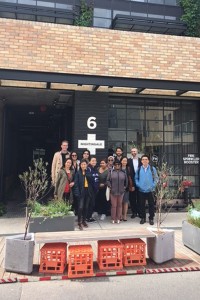 “For me, the visit to Nightingale Housing was the highlight. Looking at a project that’s already been running successfully by residents was a motivation for me to encourage my peers to step up and do something, instead of solely analysing or reporting the issues.” – Zoljargal Mendbayar
“For me, the visit to Nightingale Housing was the highlight. Looking at a project that’s already been running successfully by residents was a motivation for me to encourage my peers to step up and do something, instead of solely analysing or reporting the issues.” – Zoljargal Mendbayar
“The World Café on Day 1 was valuable because we saw real people, real projects.” – Joseph Strzempka
“The Nightingale tour and interaction with sustainability leaders… [and] interaction with other students of other cultures.” – Esteban Velez Vega
“Great program! Just the right pace, but at the same time I learned so much more than I expected.” – Pamela Cajilig
“I love this programme and I think I learnt a lot from it.” – Hao Yin
We also asked participants for their thoughts on the following questions:
What were your thoughts on the field trip to Nightingale Housing?
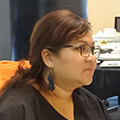 “I think what was interesting here is that it is a sort of very citizen-led development, and architects and the architectural firm are essentially filling a gap in housing that is probably not answered by the government. What was interesting for me there or was key to that, is having a financial model that allowed them to take greater control of how things could be designed, and also working with the purchasers and the home owners as early as possible in the design process, so that they could come up with a structure that everyone could be happy with.” – Pamela Cajilig
“I think what was interesting here is that it is a sort of very citizen-led development, and architects and the architectural firm are essentially filling a gap in housing that is probably not answered by the government. What was interesting for me there or was key to that, is having a financial model that allowed them to take greater control of how things could be designed, and also working with the purchasers and the home owners as early as possible in the design process, so that they could come up with a structure that everyone could be happy with.” – Pamela Cajilig
“It was a perfect example of transit-oriented development, it was pretty cool to see it in person.” – Esteban Velez Vega
What opportunities do you think the world’s urban areas are currently not taking advantage of?
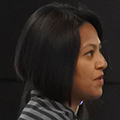 “I believe that the governments are not looking at what the people want… People will share with you their inspiration, the future, and the vision that they have for them or for their family to live in a city. What I have seen from where I come from and from various cities around the world, is that people participation is of the least interest of cities, and I think if their voice is heard, I believe we can plan cities in a more beautiful way for everyone to live in.” – Vishanthini Kanasan
“I believe that the governments are not looking at what the people want… People will share with you their inspiration, the future, and the vision that they have for them or for their family to live in a city. What I have seen from where I come from and from various cities around the world, is that people participation is of the least interest of cities, and I think if their voice is heard, I believe we can plan cities in a more beautiful way for everyone to live in.” – Vishanthini Kanasan
How does your research or your work connect to sustainable urban development?
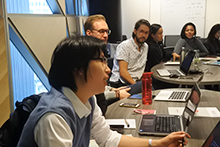 “For me, my work relates to how renewable energies can be implemented either for self consumption of for reducing electricity from the grid… it’s three things: energy conservation, energy efficiencies, and renewable energy.” – Ranaporn Tantiwechwuttikul
“For me, my work relates to how renewable energies can be implemented either for self consumption of for reducing electricity from the grid… it’s three things: energy conservation, energy efficiencies, and renewable energy.” – Ranaporn Tantiwechwuttikul
“My research is on shelter and settlements, and I specifically focus on post-disaster recovery after typhoons, so [my research] touches on several SDGs in relation to sustainable cities and climate resilience. [This training programme] has really given me a critical lens with which to view sustainability in relation to my work.” – Pamela Cajilig
What skills do leaders of the future need?
“I think as a leader, we should not only think about how to communicate what [people] want to hear, but more about what they should think about, so we do not limit their horizon only into such an anthropocentric approach, but to actually expand their perspective on sustainability.” – Zahra Zafira Mutiara
——————————————
Photos
Photos from the 2018 ProSPER.Net Leadership Programme can be found on ProSPER.Net’s Facebook page here.
